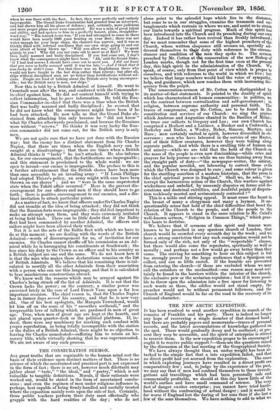THE CONSECRATION SERMON.
ALL great truths' that are cognizable to the human mind rest the basis of their evidence upon distinct matters of fact. There is no science of which the ascertained and practical part is not expressed in the form of fact ; there is no art, however much dilettanti may jabber about "taste," "the ideal," and "poetry," which is not reducible to tangible definitions. Morals, if their rationale were worked out, would be stated in the form of ascertained conclu- sions; and even the regimen of men under religious influence is perhaps, best capable of being firmly handled and usefully treated where the exposition mainly rests upon the side of fact. Certainly, those public teachers perform their duty most effectually who grapple with the hard realities of the day ; who do not
alone point to the splendid hope which lies in the distance, but come to us in our struggles examine the trammels and en- tanglements which restrain us where we are, and assist us tO strain our limbs towards a spiritual progress. Much of this spirit has been introduced into the Church and its preaching during our own day. Indeed it has rather been revived than freshly introduced; for we must remember that some of the highest preachers of the Church, whose written eloquence still arouses us specially ad.. Nis dressed themselves to duty with reference 'to the aroma_
stances and condition of men they spoke to. The sermon preached by Mr. Cotton at consecration of the new Bishop of
London marks, though not for the first time even at the present day, this high spirit in the administration of the Church. We speak, of course, only from that point of view which is "proper to ourselves, and with reference to the world in which we live; but we believe that large numbers would hail the voice of sympathy, help, and guidance, which now reaches them with increasing fre- quency from the pulpit. The consecration-sermon of Mr. Cotton was distinguished by its matter-of-fact statements. It pointed to the duality of spirit which has characterized all human communities : in politics, we see the contrast between centralization and self-government; in religion between supreme authority and personal faith. The traces Of compromise, says Mr. Cotton, are to be found in the constitution and services of our Church : we sing the praises which Ambrose and Augustine chanted in the Basilica of Milne; we trace our collects to Gregory and Leo'; our own Church has comprised a Herbert and a Latimer, a Hooker and a Cudworth, a Berkeley and Butler, a Wesley, heber, Simeon, Martyn, and Hare ; men certainly united in spirit, however diversified in ob-
servance • men who have laboured in the service of one Master, and of ob- servance; fellow creatures, however they were toiling along
separate paths. And while there is a swelling tide of human sin and misery—while we are told that the hold of the Church on the mass of the people is even now diminishing—while cries and prayers for help pursue us—while we are thus turning away from the straight path of duty—" the newspaper-writer' the satirist, and the popular novelist, are labouring to correct those evils which the Church was designed to cure ; and some colour is given for the startling assertion of a modern historian, that the press is the chief spiritual power in England." Shall we, he asks, "in- terrupt the harmonious action of the Church, this warfare against wickedness and unbelief, by unseemly disputes on forms and de- corations and doctrinal subtilties, and doubtful points of disputa- tion recklessly mooted and acrimoniously contested ?"
This is a noble and stirring appeal. It must rouse the heart in the breast of many a clergyman and many a layman. It an- questionably seizes fast hold of the chief difficulties that beset the relation of the Church to the people, and of the people to the Church. It appears to stand in the same relation to Mr. Caird's well-known sermon "Religion in Common Things," which prac- tice bears to doctrine.
We believe that if sermons of this spirit and tenour were known to be preached in any spacious church of London, that church would be crowded every seventh day in the week ; and we have a strong conviction that any such congregation would not be formed only of the rich, not only of the " respectable " classes, but there would also come the reprobates, spiritually as well as morally ; and perhaps not a few would go away better than they came. The craving for something to hear on this subject is but too strongly proved by the large audiences that a Spurgeon can collect, and can so little enrich. If the humble are prevented from entering the church—if those are excluded whom we may call the outsiders or the unclassified—one reason may most cer- tainly be found in the barriers within the interior of the church, the exclusive pew or the sectarian repulsion ; but if it werepossi- ble to throw open the admission into a free space for listening to such words as these, the edifice would not stand empty, the preacher would not be without permanent followers, and the Church of England would be far on the road to the recovery of its national character.


























 Previous page
Previous page